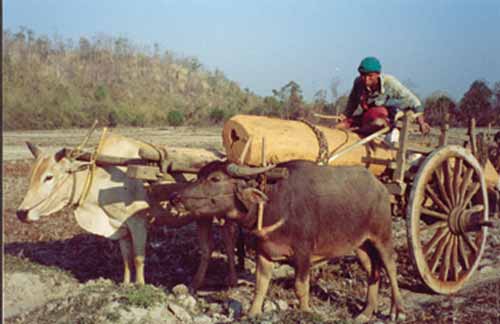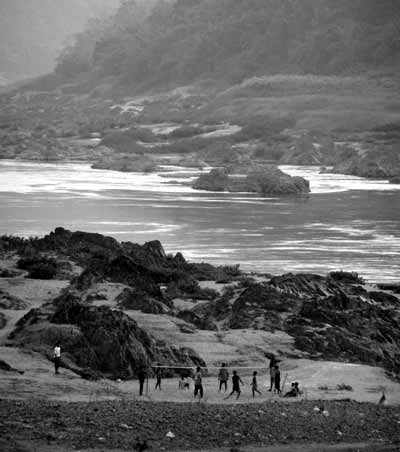The
livelihood of the Karen is incredibly tied to the natural world
around them. Therefore, the degradation of the environment has
a huge impact on the quality of their lives. Traditionally, all
of their food comes from the earth around them, and today, many
villages remain nearly self-sufficient. Their traditional means
of growing rice relies on rotational farming, where one field
is cleared of trees and planted for a one-year crop. The next
year a new field is cleared, and after around seven years, they
return to clear the original field and continue the cycle. This
sustainable practice is common among native or indigenous people
throughout the tropics because it is the most effective way to
earn a sustainable living from the poor tropical soil.
As refugees, the Karen can no longer grow
rice, although some are able to practice small-scale vegetable
farming to supplement their diets. Unfortunately, the refugees,
especially the youth are slowly losing touch with the natural
environment around them as it relates to their livelihood. Many
people tell us about the natural beauty of their homeland and
how much they miss it: the crystal clear streams, waterfalls,
mountaintops, and dense forests full of wildlife. Unfortunately,
as they wait in the camps to return home, they are forgetting
their traditional way of life while at the same time their precious
land, which they love so much, is being destroyed.

painting by Klomu, Mae La Camp
A small grass roots Karen organization,
KESAN (Karen Environment Social Action Network), is working to
keep the strong environmentally conscious values alive within
the Karen community while they are in the refugee camps. In addition,
they are working to empower and educate Karen, both in camp and
in Karen State, to preserve their natural environment. KESAN also
contributes their research to various NGO’s concerned about
the environment in Burma.
The major environmental issues facing the Karen in their homeland
in Burma are logging and the damming of rivers. The cash-strapped
military regime of Burma is clearing the once abundant teak forests
and selling them off illegally to Thai or other businesses. Thai
businesses and even the Thai government are negotiating several
large-scale dam projects with the military regime. The business
interests and the military regime would reap huge benefits while
the locals would suffer the loss of their livelihood.
LOGGING

-Karen State villager with timber
(Photo- KESAN)
Since 1995, the SPDC has dramatically expanded
the amount of territory it controls in Karen State. As a result,
state-owned and private businesses have moved further into Karen
State to log the relatively untouched hardwood forests. Much of
the wood then makes its way illegally into Thailand or other countries.
A lot of this teak wood ends up in the homes of Western developed
nations.
Additionally, many ordinary Karen people
are facing desperate living conditions after nearly five decades
of civil war. Many villagers have to engage in environmentally
destructive agricultural practices, such as “slash and burn”
cultivation methods, where they clear a new plot of land every
year, instead of their traditionally more sustainable rotational
techniques in order to grow food to feed themselves and their
families. Many of these same people have to harvest timber (e.g.
hardwoods and charcoal) at unsustainable rates in order to earn
enough money to purchase food and other necessities.
These factors have contributed to large
scale clear-cutting in many areas and a range of other environmental
problems that stem from this practice. The land that the Karen
once survived off for generations will not be suitable for their
livelihood upon their return.
DAMS
Another major issue at the
moment is the proposed dams on the Salween River. The Salween,
one of Asia’s last un-dammed major rivers, originates in
Tibet. It enters Burma in the Shan state. At the moment there
are plans to start building a dam in Shan State. Already scores
of people have been relocated and are being used as forced labor
in preparation for the massive construction project.

Salween River
Downstream, the Salween
flows into Karen State, where it is the lifeblood of the local
villages. There are also plans for dams in this area. Thousands
of acres will be flooded and thousands of Karen villagers will
lose their land and the river system that provides fish for their
livelihood. The SPDC is starting to move troops to control the
area and perpetrate its vast array of Human Rights abuses. These
massive dam projects can be accomplished only with the investments
of outsiders. In this case, Thai businesses, the Energy Department
of the Thai government, and other multinational corporations are
the leading funders.
As with most,
if not all, major dam projects around the world, the local people
are clearly the losers. In most cases they lose everything, and
their governments or the businesses involved do little to help
them. Thailand itself is learning the hard way about its own recent
dam projects. Certainly, the dams in Karen State will only bring
more power to the ruling military regime, while destroying the
once sustainable lifestyles of the local people.
Click
this link to read a July 2004 editorial about dams.
It is plain to see that
the lives the Karen refugees will return to in their homeland
will be quite different. The forests, and all the natural resources
within them, will be depleted, and thousands of acres of land,
including villages, stand to be inundated under massive dam projects
designed in far off capitals. Sadly enough, this situation is
not unique to Burma. As our populations consume more and more
resources, those who live simply will simply have no way to live.
For more information about
the relationship between the Environment and Human Rights in Burma
and simple steps you can take to help out, please visit
www.earthrights.org.
next
page
|

